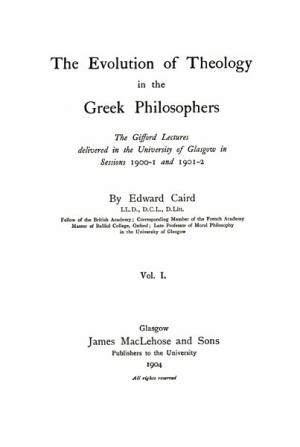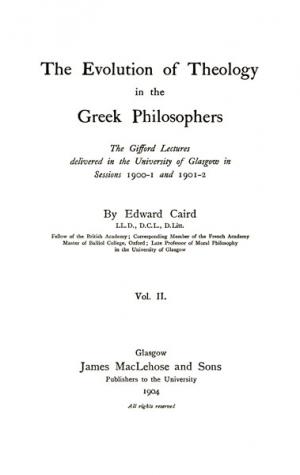The Evolution of Theology in the Greek Philosophers gives an account of those ideas of Greek Philosophers which have decisively affected the subsequent development of theological thought. The selection of topics is confined mainly to the writings of Plato and Aristotle, to the main representatives of the Stoic philosophy, and to Philo and Plotinus among the Neo-Platonists.
The Evolution of Theology in the Greek Philosophers
Books
The Evolution of Theology in the Greek Philosophers, vol. 1
Lecture First: The Relation of Religion to Theology
Lecture Second: Stages in the Evolution of Theology
Lecture Third: The Precursors of Plato
Lecture Fourth: The Beginnings of the Platonic Idealism
Lecture Fifth: The Nature of Ideas and their Systematic Unity
Lecture Sixth: The State and the Idea of Good
Lecture Seventh: Further Development of the Theory of Ideas
Lecture Eighth: The Immortality of the Soul and the Idea of God
Lecture Ninth: The Final Results of the Platonic Philosophy
Lecture Tenth: The Transition from Plato to Aristotle
Lecture Eleventh: Aristotle's View of Reason in its Practical Use
Lecture Twelfth: Aristotle's View of Reason in its Theoretical Use
Lecture Thirteenth: Does the Primacy Belong to Reason or to Will?

Caird presents an outline of Greek philosophy, discusses its influence on the development of theology, and addresses the question of the genesis of Platonic philosophy in its logical, ethical, metaphysical, and theological aspects. He also presents an account of the theoretical and practical philosophy of Aristotle and of the Stoics. After initial discussion on the development of religion and its relation to theology, Caird focuses on the central idea of religion, and on the opposition of the secular and the religious consciousness.
The Evolution of Theology in the Greek Philosophers, vol. 2
Lecture Fourteenth: The Final Results of the Aristotelian Philosophy
Lecture Fifteenth: The General Character of the Post-Aristotelian Philosophy
Lecture Sixteenth: The Origin and Principle of the Stoic Philosophy
Lecture Seventeenth: The Stoic Synthesis of Pantheism and Individualism
Lecture Eighteenth: The Stoic Conception of the Chief Good
Lecture Nineteenth: The Stoic View of Practical Ethics
Lecture Twentieth: The Transition from Stoicism to Neo-Platonism
Lecture Twenty-first: The Philosophy and Theology of Philo
Lecture Twenty-second: The General Character of the Philosophy of Plotinus
Lecture Twenty-third: The Place of Plotinus in the Development of Greek Philosophy
Lecture Twenty-fourth: The World-soul as Mediator between the Sensible and Intelligible Worlds
Lecture Twenty-fifth: The Nature of Man and his Relation to God
Lecture Twenty-sixth: The Controversy between Plotinus and the Gnostics
Lecture Twenty-seventh: The Influence of Greek Philosophy upon Christian Theology

Volume 2 begins with discussion of Aristotle's most significant conclusions, and Caird then turns to an exposition of the general character of post-Aristotelian philosophy, this exposition providing him with a context within which he can investigate the origin and the principles of Stoic philosophy, the Stoic synthesis of pantheism and individualism, the Stoic conception of the chief good, and the Stoic view of practical ethics. These reflections are completed by a lecture describing the transition from stoicism to neo-Platonism.
- Benedikt Bock, University of Glasgow


